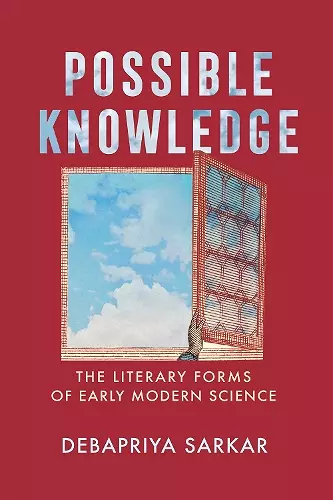Possible Knowledge
The Literary Forms of Early Modern Science
Format:Hardback
Publisher:University of Pennsylvania Press
Published:4th Apr '23
Currently unavailable, and unfortunately no date known when it will be back

Exploring the imaginative habits of thought of early modern thinkers—including Shakespeare, Milton, Sidney, Bacon, Spenser, and Cavendish—Possible Knowledge enacts a history of ideas that centers literary studies and suggests that what we term a history of science might ultimately be a history of the imagination.
The Renaissance, scholars have long argued, was a period beset by the loss of philosophical certainty. In Possible Knowledge, Debapriya Sarkar argues for the pivotal role of literature—what early moderns termed poesie—in the dynamic intellectual culture of this era of profound incertitude. Revealing how problems of epistemology are inextricable from questions of literary form, Sarkar offers a defense of poiesis, or literary making, as a vital philosophical endeavor.
Working across a range of genres, Sarkar theorizes “possible knowledge” as an intellectual paradigm crafted in and through literary form. Sixteenth- and seventeenth-century writers such as Spenser, Bacon, Shakespeare, Cavendish, and Milton marshalled the capacious concept of the “possible,” defined by Philip Sidney as what “may be and should be,” to construct new theories of physical and metaphysical reality. These early modern thinkers mobilized the imaginative habits of thought constitutive to major genres of literary writing—including epic, tragedy, romance, lyric, and utopia—in order to produce knowledge divorced from historical truth and empirical fact by envisioning states of being untethered from “nature” or reality.
Approaching imaginative modes such as hypothesis, conjecture, prediction, and counterfactuals as instruments of possible knowledge, Sarkar exposes how the speculative allure of the “possible” lurks within scientific experiment, induction, and theories of probability. In showing how early modern literary writing sought to grapple with the challenge of forging knowledge in an uncertain, perhaps even incomprehensible world, Possible Knowledge also highlights its most audacious intellectual ambition: its claim that while natural philosophy, or what we today term science, might explain the physical world, literature could remake reality. Enacting a history of ideas that centers literary studies, Possible Knowledge suggests that what we have termed a history of science might ultimately be a history of the imagination.
"Possible Knowledge is an important contribution to our understanding of the role of imaginative thinking in shaping early modern discourses of science and empiricism, and it should be read widely by scholars invested in taking seriously literature and its place in histories of epistemology...[A] powerful voice in the defense of poesy." * Modern Philology *
"Brilliant...[T]his is a book that is fascinating for scholars of literature, medievalists and parvenus of early science, but also fits within the rising focus on ‘weak knowledge’ and the inspection of bodies of knowledge that have lost ground by substitution, starvation or abandonment. It presents an intriguing pathway for interdisciplinary researchers seeking an epistemological bridge between the scientific process and the literary, where artefacts of scientific analysis are not sought merely in text, but in methodological analysis of artistic process." * The British Society for Literature and Science *
"[A]s a sustained exploration of 'how poesy thinks,' of how early modern fiction-making helped delineate the period’s ontological and epistemological contours, Possible Knowledge is an engaging and stimulating read." * Renaissance and Reformation *
"This pathbreaking book will be at the vanguard of a new movement in literature and science studies." * Jenny C. Mann, New York University *
"An ambitious, brilliant, and genuinely original account of the constitutive relationship between poesy and science in early modernity." * Vin Nardizzi, University of British Columbia *
"This important book provides compelling evidence that early modern literature in the age of the new science helped readers develop sophisticated forms of knowing about what existed in the world, and, more crucially, what might possibly come to be." * Mary Thomas Crane, Boston College *
- Winner of Winner of the Sharon Harris Book Award, granted by the University of Connecticut Humanities Institute 2024 (United States)
ISBN: 9781512823356
Dimensions: unknown
Weight: unknown
280 pages